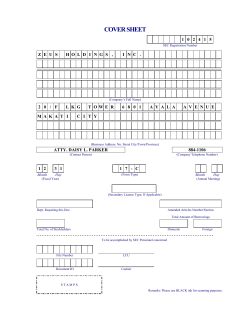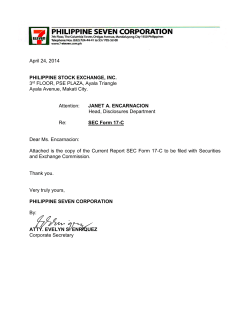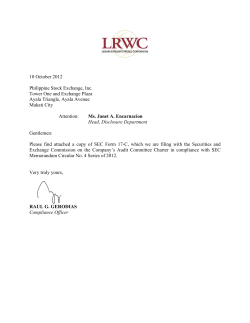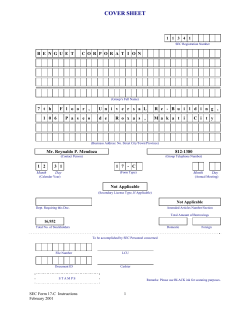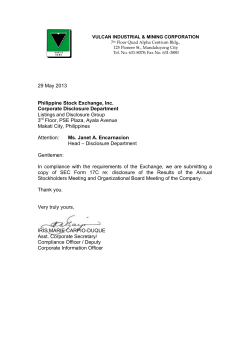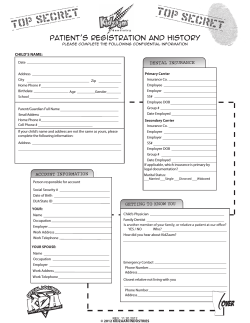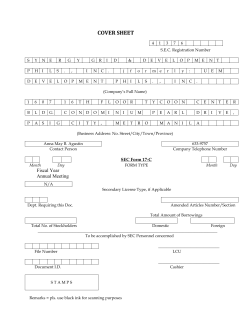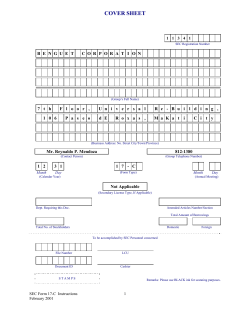
How to Discuss Disgust! CBC 2013 2/1/2013
2/1/2013 How to Discuss without Disgust! CBC 2013 By: Heidi Miller, Andy Borrelli and Barb DeardorffISTA UniServ Directors Purpose • Review the mandatory subjects of discussion . • Knowing is different than implementing. • Today, we will focus on HOW to Discuss. – – – – Best practices Worst practices How to get around road blocks When to cry “Uncle” and call your UD Discussion: Mandatory Subjects • IC 20-29-6-7 Subjects of discussion Sec. 7. A school employer shall discuss with the exclusive representative of certificated employees the following items: (1) Curriculum development and revision. (2) Textbook selection. (3) Teaching methods. (4) Hiring, evaluation, promotion, demotion, transfer, assignment, and retention of certificated employees. (5) Student discipline. (6) Expulsion or supervision of students. (7) Pupil/teacher ratio. (8) Class size or budget appropriations. (9) Safety issues for students and employees in the workplace, except those items required to be kept confidential by state or federal law. (10) Hours. As added by P.L.1-2005, SEC.13. Amended by P.L.48-2011, SEC.18. 1 2/1/2013 Team • Members of the Team – Chairperson – Secretary – Team members (including one or two who focus on the body language of the administration team) – You may wish to vary team members based on topic. It’s your team…you pick them. • UD? – Most of the time, no. – But, Discussion has been elevated to be nearly equal with Bargaining. Treat it as an equal and don’t be afraid to have your UD in to help when things get sticky. Agendas and Minutes • Agendas – Have one!!! – Build it ahead of time. – Share it with administration, so they may add items. – Use the previous meeting’s minutes to drive the next meeting’s agenda. – See Calendar of Suggested Topics – Examples… • Minutes – Keep them!!! – Minutes belong to the Association, therefore, you should be taking the minutes, not the corporation. – If you chose to agree to minutes, that can be acceptable. However, your minutes are the official version that your UD wants if we have to fight a battle. 2 2/1/2013 Collecting Topics • Use the Calendar of Suggested Topics to help guide you. • Member input is important in driving the discussion of topics. But not all members’ concerns are discussable. Be prepared to weed though the topics. • This requires you talk to your members and set up a means for them to give you suggested topics. – Do NOT allow for anonymous contributors. – However, do NOT share names of contributors with administration. – Those names are for you and your leaders to be able to respond to members concerns. • Ask the Administration for their topics. Pre-Discussion Meeting • ARGHHHH!!!!! Not another meeting!!! • To keep your team aware of topics and to come to consensus before you go to Discussion, you need to meet for a pre-Discussion talk. • Would you bargain without prep? What’s the difference?? • How weak will you appear if you argue with each other in front of the administration? At the Meeting Be Strong Behave Be an Advocate Believe • • • • • • • Don’t be mad. Be consistent. Stay on topic. Keep your team under control. Caucus if needed. Take notes. Breathe. Ask clarifying questions. Norms of Collaboration 3 2/1/2013 Definition of Discussion • IC 20-29-2-7 "Discuss" Sec. 7. "Discuss" means the performance of the mutual obligation of the school corporation through its superintendent and the exclusive representative to meet at reasonable times to: (1) discuss; (2) provide meaningful input; or (3) exchange points of view; with respect to items enumerated in IC 20-29-6-7. As added by P.L.1-2005, SEC.13. Scenario 1- One to One Computing • Pre-Discussion – – – – – What are the teachers’ questions and/or concerns? How will this be implemented? How far along is the process? What training do you need? How will this impact your schedule, teaching methods, curriculum, text books, discipline, evaluation? • At Discussion Ask the questions you develop in pre-discussion. Be prepared for IDK. Ask for follow-up. What do you mean you don’t want computers? How could you be so selfish? Scenario 2- Final Evaluation Rating • Pre-Discussion – Weighting of walkthroughs v. short observations v. long observations? – How will the final rating be determined based on the above weighting. – Etc… • At Discussion It’s MY right to determine the weight of the scores. It’s my professional judgment. “You don’t need to worry about that.” 4 2/1/2013 Scenario 3- RIF • Pre-Discussion – – – – What criteria will be used for performance? What will be the tie-breakers? How will recall work? How will we ensure fairness to avoid valid EEOC complaints? • At Discussion Why would we want to recall bad teachers? Of course we are always fair! This is an administrative decision. Be prepared for an unpleasant conversation. One and Done…Seldom • One meeting and we are done, right? • Not usually…most topics require further discussion. In all three scenarios, it is very unlikely you would finish thoroughly discussing the topic in one session. • You may need additional information from your teachers. • They may need to research answers to questions you raised. • You may have additional suggestions to present. • They may need to consider your suggestions and talk about their merit. MEANINGFUL DISCUSSION EXCHANGE OF IDEAS Help!!! They are ________! IC 20-29-7-1 Unfair practices by school employer Sec. 1. (a) It is an unfair practice for a school employer to do any of the following: (1) Interfere with, restrain, or coerce school employees in the exercise of the rights guaranteed in IC 20-29-4. (2) Dominate, interfere, or assist in the formation or administration of any school employee organization or contribute financial or other support to the organization. Subject to rules adopted by the governing body, a school employer may permit school employees to confer with the school employer or with any school employee organization during working hours without loss of time or pay. (3) Encourage or discourage membership in any school employee organization through discrimination in regard to: (A) hiring; (B) tenure of employment; or (C) any term or condition of employment. 5 2/1/2013 Help!!! cont… (4) Discharge or otherwise discriminate against a school employee because the employee has filed a complaint, affidavit, petition, or any information or testimony under this article. (5) Refuse to: (A) bargain collectively; or (B) discuss; with an exclusive representative as required by this article. (6) Fail or refuse to comply with any provision of this article. (b) If: (1) a complaint is filed that alleges an unfair practice has occurred with respect to a subject that may be discussed under this article; and (2) the complaint is found to be frivolous; the party that filed that complaint is liable for costs and attorney's fees. As added by P.L.1-2005, SEC.13. Amended by P.L.48-2011, SEC.26. FILE IT! • UD’s file ULP’s. • We write them. Send them to ISTA for approval. Then they are submitted to IEERB. • We need from you: – – – – – Discussion minutes Emails Anecdotal notes School Board minutes Any other related materials • Were you aware of the item? • Did you request discussion or bargaining? • Did you acquiesce? Oh No!!! I’ve been acquiescing! • Acquiescence -- letting them do what they want, when they want, without holding them accountable. • Step 1: Stop Acquiescing. – Send the Discussion letter at the beginning of the year. – Meet with superintendent to explain your vision of true discussion. • Step 2: Discuss…for real – This is not MEET AND TELL – You do NOT have to let them run you over. – Yes, they have the final say…but make your voice and your members’ voice heard. 6 2/1/2013 The Supt has All The Power-NOT! • “The duty to discuss, therefore, arose when the Corporation determined it would change an established practice within the Corporation.” Tippecanoe U-92-47-7865 • “…meaningful input requires a willingness to discuss prior to implementation…” Evansville, (1980) • “…it must be provided before a unilateral change is made in a Section 5 (discussion) item.” Lafayette, (1991) • If several meetings are required then several meetings must take place. Cloverdale (1984) • If all aspects have been discussed then the obligation is fulfilled. Marion (1976) Time, Time, Time • Discussion is no longer a monthly endeavor. • Discuss as often as needed. Don’t be afraid to ask for multiple meetings or topic specific meetings. • The time you save by bargaining being limited to a small scope in a short window will now be devoted to discussion. You are NOT an Island • Utilize your network of schools to talk across counties and districts about what is happening in discussion. • Your superintendents do it. • So should you! 7 2/1/2013 Have a Great Year Filled with Quality Discussion! Please fill out your evaluation before you leave. 8
© Copyright 2025

